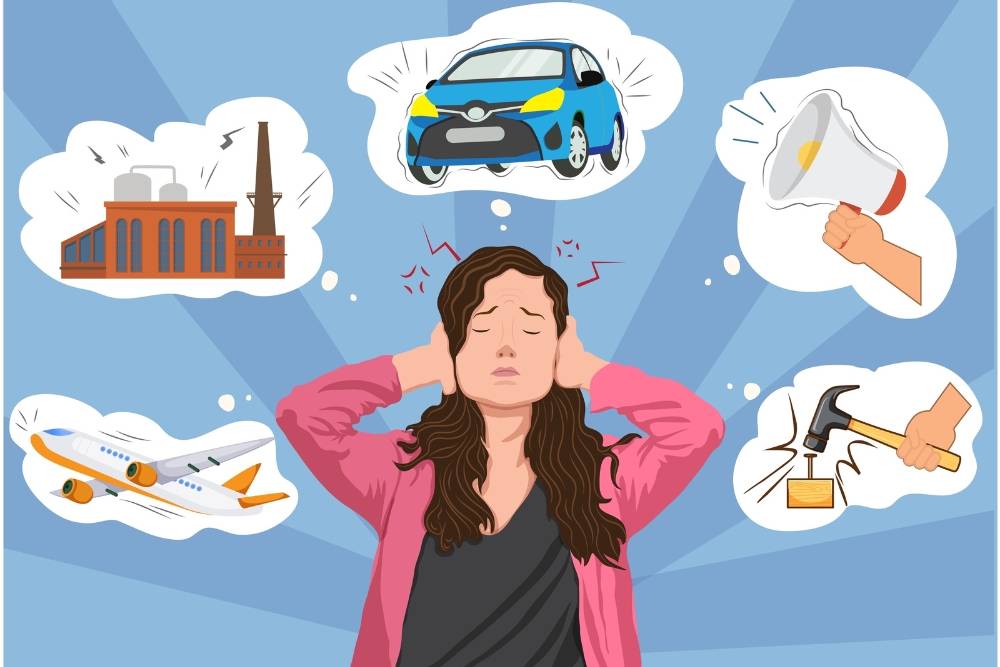There’s nothing quite like the symphony of banging hammers and buzzing drills of a home renovation project playing in the background as you’re trying to type up a report. It’s impact? Assaulting your brain like it’s a leaf blower trying to scatter your thoughts into the wind.
This was a common experience for many of us during the COVID-19 lockdowns. After all, being stuck at home for so long equalled an opportunity to spend time giving your house a little makeover.
But for those forced to perform work or undertake school lessons at home, the acoustic effect of such projects was a particularly excruciating way to test our patience during already trying times.
Such instances illustrate the power of noise pollution on our mental wellbeing, and form part of an array of aural annoyances that include the incessant sounds of traffic, and overly loud pop music.
Even worse? The fact that it’s not just our mental health that suffers.
Why Noise Pollution Is So Distracting

Noise pollution involves unwanted sounds that disrupt our ability to concentrate, making it difficult to engage in tasks that require our full attention.
Why, you ask?
Because that’s just how our brains operate.
When we hear loud noises, our instincts suggest that there is danger, so our focus is diverted to the cause of the sound in order to assess the situation and ensure our safety.
Furthermore, it activates the brain’s amygdala, the region responsible for processing emotions and triggering the fight-or-flight response. This activation floods the body with stress hormones like cortisol and adrenaline, heightening anxiety and impairing concentration.
“Stress is our body’s natural response to environmental threats, things that we perceive to be dangerous,” said Dr Tay Kai Hong, a Psychiatrist and Co-Founder of Private Space Medical.
Essentially, if you hear loud noises, you should be on guard.
While it’s an evolutionary safeguard, the problem comes when these noises prove to be from sources harmless to our immediate wellbeing…which just makes it a huge ole’ distraction.
However, excessive noise pollution is more than just a nuisance – it can have serious implications for both our mental and physical wellness.
How Noise Pollution Hurts Our Health
Prolonged stress can lead to:
- Mental Strain: Irritability, anxiety, and cognitive fatigue.
- Physical Strain: Elevated heart rate, blood pressure, and risk of cardiovascular diseases.
- Hearing Damage: Tinnitus or hearing loss from sounds over 85 decibels, common in heavy traffic.
Constant exposure to a loud noise means constant stress, and that can take a toll on our mental state. This goes beyond increasing cognitive fatigue – your brain doesn’t deal well with the continuous anxiety attacks and the overstimulation. It only worsens your mood, making you feel irritable, helpless, and on edge.
Furthermore, the rise in cortisol and adrenaline is accompanied by a host of other physiological changes, including an elevated heart rate and blood pressure. All of these changes serve to disrupt regular bodily functions, and can, in the extreme, negatively influencing your cholesterol, blood sugar levels, and other processes. This can increase your risk of developing cardiovascular disorders – including heart attacks.
Not to mention the potentially lasting impact noise pollution has on our hearing – listening to any sound above 85 decibels (which you might experience during heavy traffic) too often and for too many hours can result in hearing loss. Constantly hearing loud noises can also bring about tinnitus, a ringing in your ear that occurs despite the lack of an external sound.
Note that these are just some of the ways noise pollution can harm us – which makes it important for us to figure out methods for curbing its impact.
Muting the Impact of Noise Pollution
If you ever feel the noises are digging too deep into your nerve centres, then it’s time to take action.
These include:
- Investing in noise-cancelling headphones or earplugs that can help block out any unwanted noises, thus enabling you to remain undistracted from your tasks.
- Soundproofing your house using insulation or homely additions such as carpets and curtains to muffle sounds.
- Simply leaving a noisy area for a quieter place. This means if someone’s rocking out next door while you’re working from home, it might be time to explore a café, or just get back to the office.
And if you realise your ears are not feeling quite right, get it checked out. A doctor, in collaboration with audiologists and other allied health professionals, can assess your hearing and identify potential issues like tinnitus or hearing loss.
It’s important not to overlook the profound impact noise pollution can have on our quality of life. Any measure we take to create a more serene environment for ourselves is worth it for our wellbeing.

